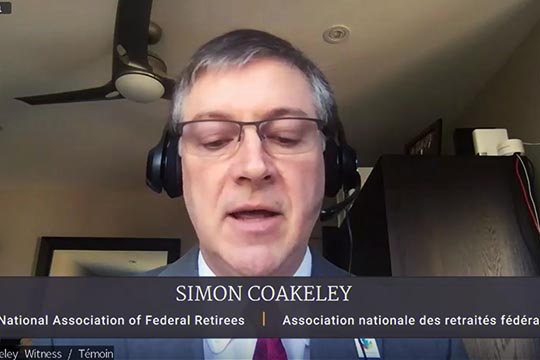
Federal Retirees CEO Simon Coakeley is calling on the government to ensure equitable outcomes for all veterans.
On Nov. 12, 2020, Simon Coakeley, CEO of the National Association of Federal Retirees, appeared before the House of Commons Standing Committee on Veterans Affairs in their study of the persistent backlog of disability benefit claims at Veterans Affairs Canada.
Department officials were quick to shift the blame to veterans, pinning the reason for the backlog on incomplete applications and missing information. But what is really needed is a hard look at a system that some veterans have said is broken beyond repair.
Watch Coakeley’s opening remarks to the House of Commons Standing Committee on Veterans Affairs below.
“Transition to civilian life can be challenging for those dealing with illness, injury or trauma, and this is unfortunately often further complicated by the absence of any systemic approach to ensure veterans have continued access to medical care,” said Coakeley. “These issues are compounded by unreasonable wait times for disability benefit processing at Veterans Affairs Canada, which results in a lack of veteran confidence in a system they must rely on.”
Although there is little doubt that a backlog can be dealt with by an army of new staff and an infusion of cash, Coakeley was clear that the backlog is not a homogenous lump of claims. Other witnesses reminded the Committee that addressing the backlog with an influx of human and financial resources now will only be a temporary fix if the systemic issues that led to the backlog are not addressed.
Some veterans are waiting longer than others and are more seriously impacted by the backlog. Citing the Office of the Veterans Ombudsman’s report on Timely and Transparent Decisions from 2018, Coakeley reminded the Committee that anglophone applicants waited, on average, 24 weeks for a decision while francophones waited an average of 45 weeks. 42 per cent of female clients waited over 40 weeks for a decision, while only 26 per cent of male clients waited that long.
The backlog means thousands of veterans are waiting on decisions from the department – a wait that deprives them of necessary benefits and medical care. The longer the wait, the more serious some cases can become. Some applications have been pending for years, despite the department’s service standard for 80 percent of decisions to be made within 16 weeks. In fact, the department is meeting that standard with only 37 per cent of the applications it receives, according to its 2018-2019 reporting.
Federal Retirees supported, but also cautioned, the Committee on an evidence-based, automated approval approach for applications for some conditions – one of the “clear the decks” solutions proposed to deal with the massive backlog.
A toolbox contains more than hammers and Veterans Affairs needs to make better use of some other tools. Solutions that speed up or streamline the claims process are important but it is critical to address the backlog in a way that supports the veterans who wait longest – some of them for systemic reasons. One way to do that is to require Veterans Affairs to step up its Gender-Based Analysis+ (GBA+) Strategy in the delivery of its programs and services, and to mainstream the use of GBA+ across the department.

